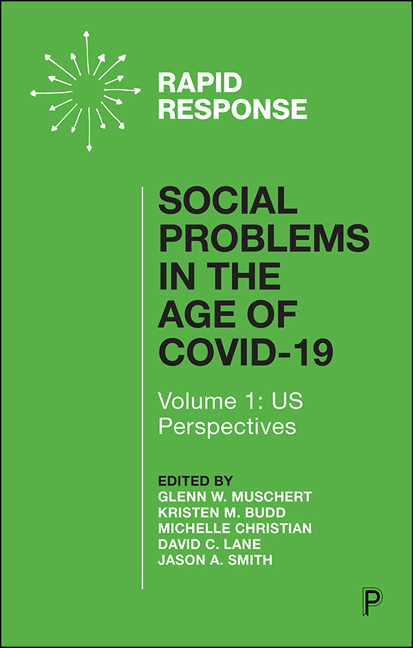Editorial Introduction
Published online by Cambridge University Press: 23 March 2021
Summary
This volume, Social Problems in the Age of COVID-19, is a rapid-response project intended to deliver rigorous academic knowledge on social problems during the coronavirus pandemic, also known as COVID-19, to a broad readership. The focus is the effect of the COVID-19 pandemic and subsequent disruptions on key social problems of widespread concern. The editorial team, chapter contributors, and publisher have pulled together to produce this volume in a fraction of the time such a project normally requires. All participants have been motivated by the need to get quality information rapidly disseminated as the world is living through the uncertain days, weeks, and months of this pandemic. In times of crisis, sociology and other social sciences seem more essential than ever to clarify new social development and challenges, not only for those working to understand what is happening, but also for those in positions to implement realistic, positive policy responses.
This volume is a special project within the larger academic project of public sociology. It is produced by the Justice 21 Committee (J-21) of the Society for the Study of Social Problems (SSSP), which periodically produces two series titled Agenda for Social Justice and Global Agenda for Social Justice. The project was inspired by the 2000 Presidential Address of Professor Robert Perrucci, 48th President of the SSSP (reprinted as Perrucci, 2001). In his address, Dr Perrucci offered a clear censure of academic social sciences, as he noted that social problems research had become increasingly abstract and detached, and therefore less useful for solving social problems or reducing human suffering. He reminded social problems researchers that they were missing the point, which was not only to study social problems, but also to reduce or abolish them. Indeed, the SSSP was founded as an academic society to study social problems with the intent to generate knowledge, which should be translated into strategies for social action and policy intervention. Dr Perrucci's speech provided an early contribution to the nascent conversation about public sociology, and within the SSSP it inspired the establishment of the J-21 Committee, whose mandate is to produce volumes studying pressing social problems while providing practical suggestions to improve the situation.
- Type
- Chapter
- Information
- Social Problems in the Age of COVID-19 Vol 1Volume 1: US Perspectives, pp. xi - xivPublisher: Bristol University PressPrint publication year: 2020



